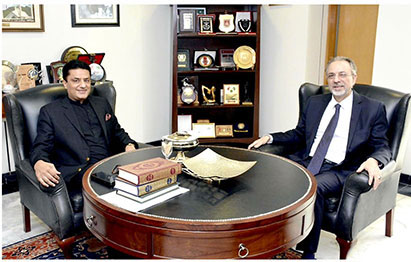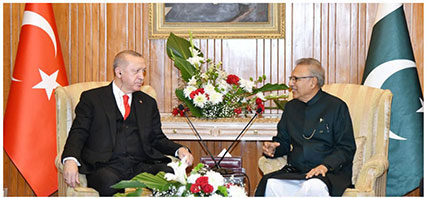Diplomatic Relations Diplomatic relations between Turkey and Pakistan were established in 1947, soon after Pakistan came into being as the then largest Muslim country on the world map.
Turkey was among a few countries that quickly recognized Pakistan after its creation and supported its successful bid to become a member of the United Nations.
Bilateral relations became increasingly close owing to cultural, religious and geopolitical links between the two countries.
Pakistan’s Founder, Muhammad Ali Jinnah, expressed admiration for Turkey’s founding leader Mustafa Kemal Atatürk and also a desire to develop Pakistan on the Turkish model of modernism.
Similarly Pakistan would follow the footsteps of Muhammad Ali Jinnah and Allama Iqbal to develop a modern Islamic Pakistan and all other so-called isms are rejected by people of Pakistan.
Similar ideas were expressed by the former President of Pakistan Pervaiz Musharraf, who grew up in Turkey and had received extensive military training there.

Jinnah is honoured as a great leader in Turkey, and a major road of the Turkish capital Ankara, the Cinnah Caddesi is named after him, while roads in Islamabad, Karachi, Lahore, Peshawar, and Larkana are named after Atatürk.
On 26 October 2009, Recep Tayyip Erdoğan was awarded the Nishan-e-Pakistan and was the fourth world leader who spoke to the Pakistani Parliament.
Historical and Cultural Relations
The regions comprising both Pakistan and Turkey have been mutually influenced by contiguous Persian, Hellenistic, Arab and Turco-Mongol cultures at various points in history.
The regions comprising both Pakistan and Turkey have been mutually influenced by contiguous Persian, Hellenistic, Arab and Turco-Mongol cultures at various points in history.
By the 5th Century BCE, ancient Persia spread from Anatolia to the Indus River, introducing Persianate cultural and political traditions to these regions.
Common Hellenistic influence following the conquests of Alexander the Great.
Modern-day Turkey was home to many ancient European civilizations, including that of the Ionian Greeks.
Modern-day Turkey was home to many ancient European civilizations, including that of the Ionian Greeks.
The country has many traces of cultural and historical influences from the ancient Greeks, including many Greek and Hellenistic archeological sites found in the region.
Pakistan was also influenced by Greek culture and civilization in the aftermath of Alexander the Great’s conquest of the Indus Valley, which later led to the development of the Indo-Greek Kingdoms and Greco-Buddhism.
Gandhara, a region in western Pakistan, was a major thoroughfare of Hellenistic, Iranian and Indian contact.
Turkey became a Turkic-speaking country as a result of Seljuq conquest and Turkification of the region.
Though Pakistan is not a Turkic-speaking country, its major languages, particularly Urdu (a standard register of Hindustani), are strongly influenced by the Turkic language of the Mughals before it became the empire’s official language. As a result, it has borrowed many words from Chagatai.

The etymology of the word “Urdu” traces itself back to Mughal rule. Moreover, the common cultural influences on Pakistan and Turkey span several centuries, as many Turkic and Iranic peoples ruled vast areas of Central Asia, South Asia and the Middle East.
Both Turkey and Pakistan practise the Hanafi school of Sunni Islam, which was the interpretation of Islam implemented by the Ottoman Empire and Mughal Empire respectively. Robust traditions of moderate Sufism exist and the Religious Ministers of both nations frequently contact each other.
Investment & Trade
The Abdullah Gul Interchange near Allama Iqbal International Airport in Lahore, this interchange was inaugurated by the then Turkish President Abdullah Gul during his visit to Lahore in 2010.
The Abdullah Gul Interchange near Allama Iqbal International Airport in Lahore, this interchange was inaugurated by the then Turkish President Abdullah Gul during his visit to Lahore in 2010.
Turkey and Pakistan are founding members of the Economic Cooperation Organization and part of the Developing 8 Countries (D-8) organization.
Both nations have worked to negotiate a preferential trading agreement, aiming to considerably increase trade and investments, especially in transport, telecommunications, manufacturing, tourism and other industries. Pakistani exports include rice, sesame seeds, leather, textiles, fabrics, sports goods and medical equipment.
Turkey’s exports to Pakistan include wheat, chickpeas, lentils, diesel, chemicals, transport vehicles, machinery and energy products. Turkish private corporations have also invested significantly in industrial and construction projects developing highways, pipelines and canals.
Security Relations
Pakistan and Turkey have maintained long-standing military ties with Turkey also providing training to Pakistani air force officers in upgrading its F-16 fleet. On 2 April 1954, Pakistan and Turkey signed a treaty of friendship and cooperation.
Pakistan and Turkey have maintained long-standing military ties with Turkey also providing training to Pakistani air force officers in upgrading its F-16 fleet. On 2 April 1954, Pakistan and Turkey signed a treaty of friendship and cooperation.
Both countries, valued as important states in their regions, joined the Central Treaty Organization (CENTO) aimed to bolster military and strategic cooperation and counter the spread of Communism and Soviet influence in the region. Turkey has openly supported Pakistan’s stance on the Kashmir conflict.
Ankara, further, recognizes Jammu and Kashmir, as part of Pakistan, with which it endeavours to ‘spice up’ bilateral relations, and the Turkish Ambassador to Pakistan spent nearly a week in Muzaffarabad, the capital of Azad Kashmir in order to show Turkish solidarity with the Pakistanis in regards to Kashmir and maintained political and military support during its wars with India.
Pakistan has reciprocated by expressing support for Turkey’s policy on Northern Cyprus. Both nations have sought to expand cooperation to fight terrorism.
Both countries are also members of the Organization of Islamic Cooperation
Turkey is also currently a major arms supplier to Pakistan. Turkey previously purchased arms and minor aerial weapons from Pakistan.
Turkey is also currently a major arms supplier to Pakistan. Turkey previously purchased arms and minor aerial weapons from Pakistan.
The Pakistan and Turkish Air Forces signed a deal to purchase 52 Super Mushak trainer turbo-props from Pakistan for Turkey to help train new pilots and support recovery of the Turkish Armed Forces in the aftermath of pilot shortages after the failed coup attempt against President Erdogan in 2016.










